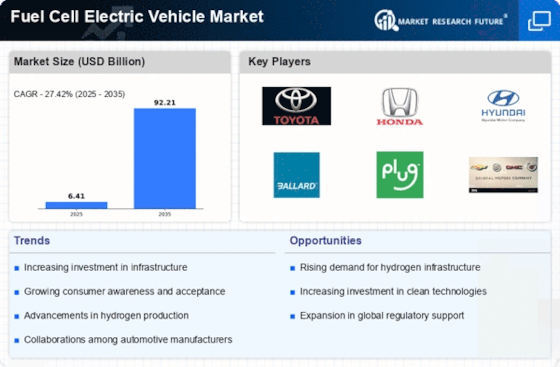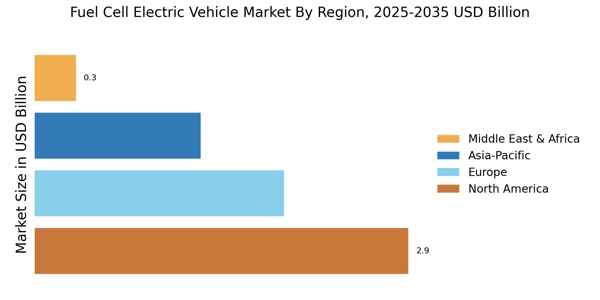Increasing Environmental Concerns
The rising awareness of environmental issues appears to be a pivotal driver for the Fuel Cell Electric Vehicle Market. As consumers and governments alike prioritize sustainability, the demand for cleaner transportation solutions intensifies. Fuel cell electric vehicles (FCEVs) produce zero tailpipe emissions, which aligns with the global push towards reducing greenhouse gas emissions. In 2025, it is estimated that the transportation sector contributes approximately 14% of total emissions, prompting a shift towards alternatives like FCEVs. This transition is further supported by various international agreements aimed at combating climate change, which may bolster the adoption of fuel cell technology in the automotive sector.
Advancements in Hydrogen Production
Technological innovations in hydrogen production are likely to play a crucial role in the Fuel Cell Electric Vehicle Market. The development of more efficient and cost-effective methods for hydrogen generation, such as electrolysis and biomass gasification, could enhance the viability of FCEVs. In recent years, the cost of hydrogen production has decreased significantly, with projections indicating a potential reduction of up to 30% by 2030. This decline in production costs may lead to increased availability and affordability of hydrogen fuel, thereby stimulating consumer interest in fuel cell vehicles. As hydrogen becomes more accessible, the market for FCEVs is expected to expand.
Expansion of Fueling Infrastructure
The expansion of hydrogen fueling infrastructure is essential for the growth of the Fuel Cell Electric Vehicle Market. As of 2025, the number of hydrogen refueling stations is projected to increase significantly, with estimates suggesting a rise to over 1,500 stations worldwide. This development is crucial for alleviating range anxiety among potential FCEV buyers, as the availability of refueling options directly influences consumer adoption. Moreover, partnerships between governments and private entities to establish a robust hydrogen network may further enhance the market landscape. The establishment of a comprehensive fueling infrastructure is likely to facilitate the transition to fuel cell technology in the automotive sector.
Consumer Demand for Alternative Fuel Vehicles
The growing consumer demand for alternative fuel vehicles is a significant driver for the Fuel Cell Electric Vehicle Market. As awareness of climate change and air quality issues rises, consumers are increasingly seeking sustainable transportation options. Surveys indicate that a substantial percentage of consumers express interest in purchasing FCEVs, particularly in regions with stringent emissions regulations. This shift in consumer preferences is likely to encourage automakers to invest in fuel cell technology, leading to a broader range of FCEV models available in the market. The alignment of consumer demand with environmental goals may further propel the adoption of fuel cell electric vehicles.
Rising Investment in Clean Energy Technologies
The surge in investment in clean energy technologies is anticipated to bolster the Fuel Cell Electric Vehicle Market. In recent years, venture capital and government funding for hydrogen and fuel cell technologies have seen a marked increase, with investments reaching billions of dollars. This influx of capital is expected to accelerate research and development efforts, leading to innovations that enhance the performance and efficiency of fuel cell systems. As the market matures, the financial backing for FCEVs may result in lower production costs and improved vehicle offerings, making them more competitive against traditional internal combustion engine vehicles.

















